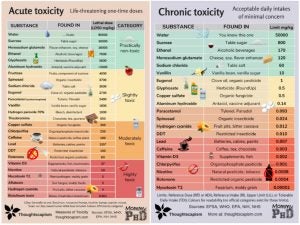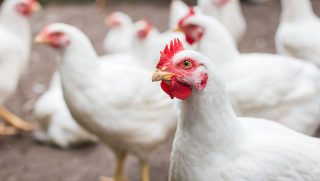“Mexico Commits to Phase Out Glyphosate,” the headline reads. “Glyphosate is the most dangerous poison in the world,” says Victor Toledo, Mexico’s Environmental Secretary. This headline is from a post that was sent to me by several people on Wednesday. The post goes on to further explain that “Mexico’s Environmental Ministry announced it will completely phase out glyphosate-based herbicides over the next four years with an effective ban by 2024,” and then it proceeds to claim that “this is not Mexico’s first time putting personal and planetary health first.”
It goes even further to make claims about glyphosate causing “serious environmental damage” and “irreversible health damage.”
Wow, that’s a lot to unpack.
First, before we get into the effects of a ban on glyphosate and whether the claims made in the post are evidence-based, let’s take a look at the page making all of these claims that everyone seems to be sharing across Instagram without any regard for science whatsoever. The page, Farmers Footprint, is another Zach Bush, MD, production. If you’re not familiar with that name, all you really have to know is that he attributes the rise in basically all chronic disease, autism, and ADHD, as well as diseases in pets and livestock, to none other than glyphosate. This is where I remind you that correlation does not equal causation. There is literally no scientific basis for his claims. Oh, he also sells supplements, because of course he does.
But this isn’t just a run of the mill vitamin or mineral — no, he sells a 32-ounce bottle of purified water with “aqueous humic substances,” so basically dirty water, for $69.95. But what does it do? Ah, I’m glad you asked. Well, it heals the gut from damage due to “toxins such as glyphosate,” of course.
OK, that’s who Zach Bush is; so let’s get back to the post. I was interested in seeing what evidence these “shocking” glyphosate claims were based off of, especially since there is no evidence that glyphosate poses any harm to consumers via trace residues in food. And because the global scientific consensus on glyphosate, which was concisely expressed by Health Canada, states that:
“No pesticide regulatory authority in the world currently considers glyphosate to be a cancer risk to humans at the levels at which humans are currently exposed.”
In fact, glyphosate is one of the safest, most effective and least toxic herbicides available to farmers today, but hey, maybe there’s new evidence that I’m not aware of. So, I clicked on the link that they provided for evidence of these claims. It brought me to a 20-minute documentary produced by Zach Bush himself. As I was trying to mentally prepare myself to watch said documentary, I read the description. It’s about a family that transitions their farm from conventional to regenerative. That’s it. That’s the documentary. Needless to say, I didn’t waste my time watching it, because a single anecdote is obviously not scientific evidence, but that’s literally all the evidence that was presented. It clearly does not back their claims. So, that’s the level of science denial we’re dealing with here.
What about the apparent claim made by Victor Toledo, the Mexican Environmental Secretary, that “glyphosate is the most dangerous poison in the world?” Well, considering the acutely toxic dose of glyphosate is greater (less toxic) than table salt and the chronically toxic dose is greater (less toxic) than caffeine, that’s quite a stretch to claim that it’s the most dangerous poison in the world.

Study after study has shown that glyphosate is actually one of the least toxic herbicides on the market and does not accumulate in the soil. Just to give you some perspective, glyphosate makes up 25 percent of all pesticides used in corn in the U.S., but it only accounts for 0.01 percent of the chronic toxicity hazard of all pesticides used in corn. Here are some responses from farmers when asked what weed control strategies they would be likely to adopt or apply more frequently in the event of a ban on glyphosate. Paraquat was mentioned a few times, which is a much more toxic pesticide than glyphosate. Unlike the body of research on glyphosate and human health, there is fairly strong evidence of real health risks from the use of Paraquat.
Glyphosate has actually replaced several herbicides that were much more toxic to humans and to the environment, so a ban would mean possibly going back to some of these harsher chemicals. Glyphosate has also allowed for a reduction in tilling as a means to control weeds, so a ban would also result in relying more heavily on tilling. This would be detrimental to both the soil and to the environment as tilling increases erosion, reduces biodiversity of insects and animals in the soil, releases greenhouse gas into the atmosphere, and increases emissions from the mechanical equipment involved.
So, while the reasoning behind these bans is for supposed environmental concerns, a ban on glyphosate can actually result in less sustainable farming practices and more harm to the environment.
This is a perfect example of greenwashing — providing misleading information and making unsubstantiated claims to deceive consumers into believing that a product or process is more environmentally friendly. It’s a pretty well known tactic when it comes to marketing campaigns for consumer products. A ban on glyphosate takes greenwashing to an entirely new level. A ban isn’t simply causing consumers to make choices based on false information, like most greenwashing does. When denying an entire country access to one of the safest, most studied, most effective herbicides available to farmers today, it forces them to use less sustainable farming practices that can be more dangerous for everyone involved. These bans are clearly not evidence-based.
If individuals and governments actually care about human health and the environment, they would not support a ban on glyphosate.
Food Science Babe is the pseudonym of an agvocate and writer who focuses specifically on the science behind our food. She has a degree in chemical engineering and has worked in the food industry for more than decade, both in the conventional and in the natural/organic sectors.



